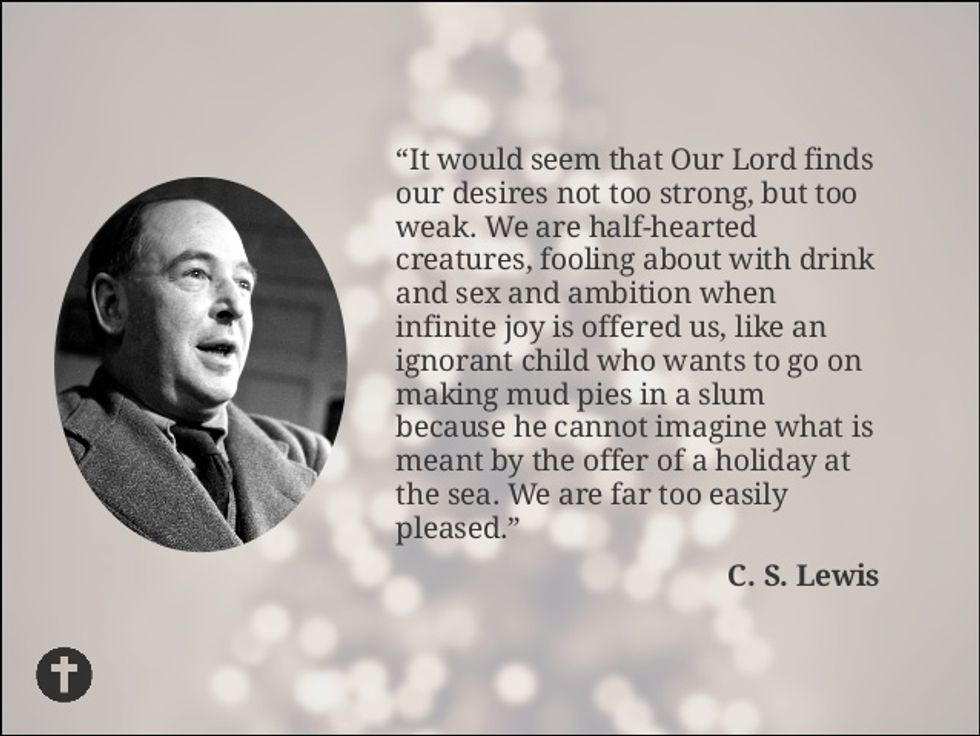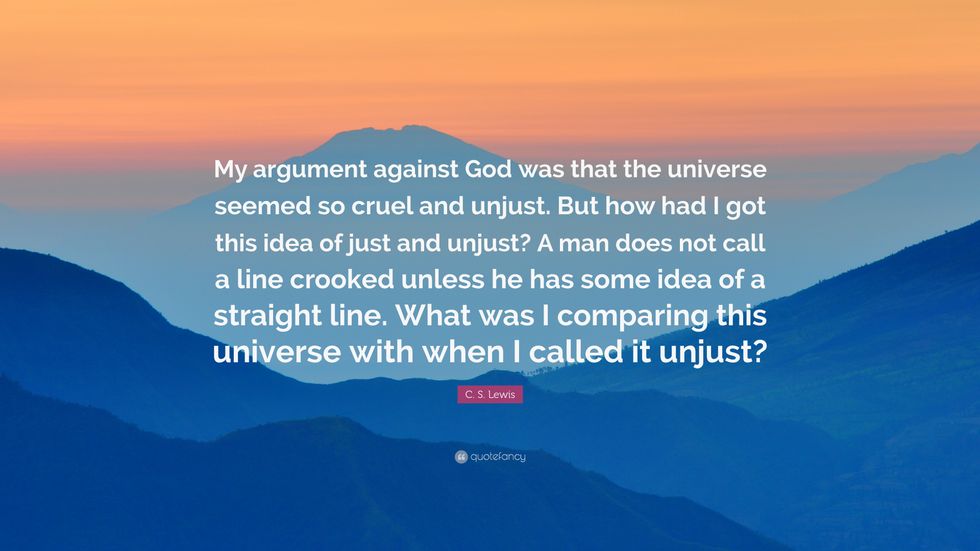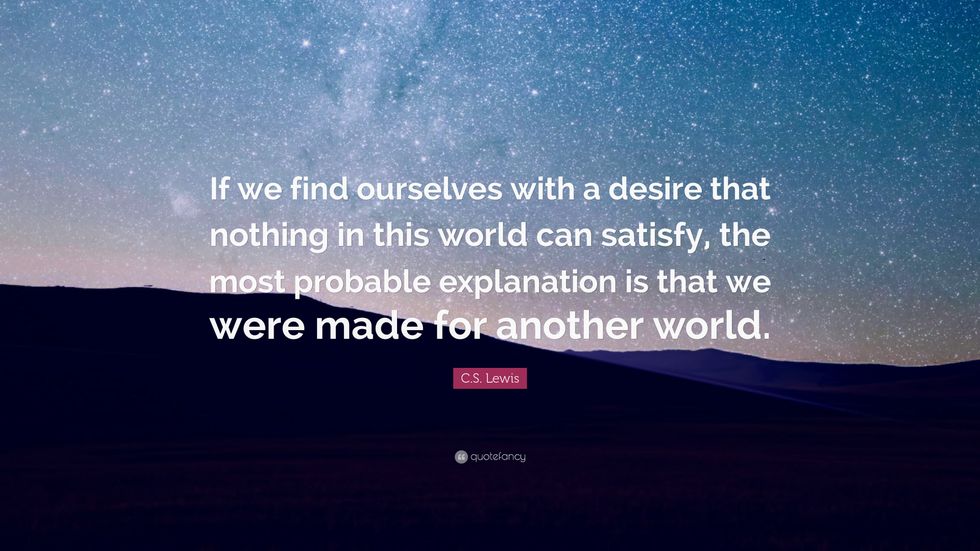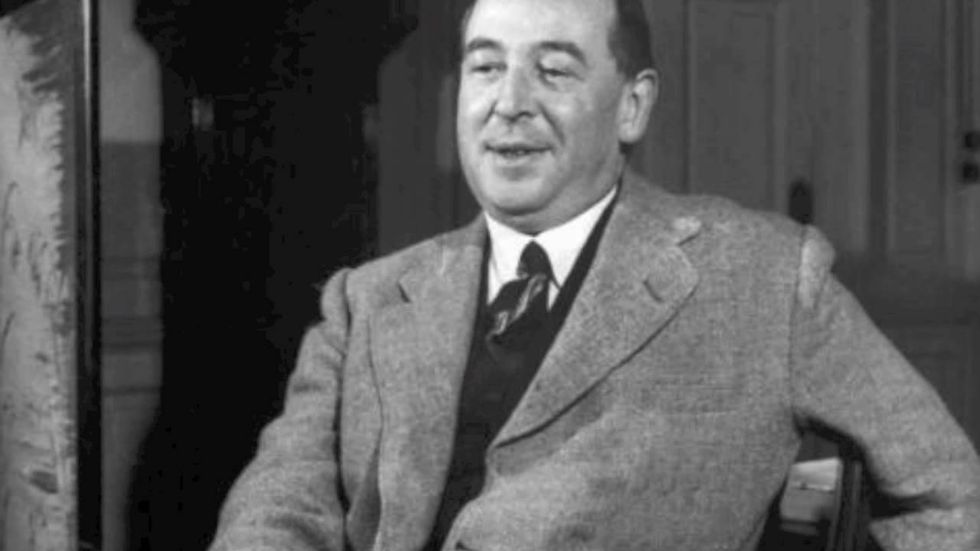As insightful as the 4 previous CS Lewis quotes are, none impact me so deeply as these 3 here. Yes, Lewis was a poet, a novelist, an academic, but his work as a Christian apologist (a person who offers an argument in defense of something controversial, as defined by Google) has had the utmost impact on my life.
I know on a personal level that it is far too easy to brand faith as simplistic, behind the times, and/or as a closed-minded variety of wishful thinking. But before I had faith, I was upside down and didn't know it, accepting explanations of life and human desires/purpose that were grounded not in truth, but grounded in my personal, fallible, biased, and upside-down perception. CS Lewis has helped to set me right-side-up.
Again, I will try and taint these quotes as little as possible with my words. My hope is that these quotes speak their volumes to you not in my way, but in a way that is personal and specific to you.
#5:

This is one of those counterintuitive truths that resonates in an unexpectedly disruptive way, but it's a pleasant disruption. We press so hard to have more, more, more -- more drink, more success, more financial security, more beauty and more approval. No wonder it's never enough -- it isn't the answer. We want more joy than what the comings and goings of earthly enjoyment (ie, mud pies) can bring. There is more joy available, if we are willing to take our eyes off of the popular and mediocre. We cannot have more -- cannot even see what is more -- if we settle for a less-than-satiating answer.
#6:

Some might argue -- I know that I did -- that our ideas of right and wrong are merely evolutionary byproducts, yielding higher survival rates for the species as a whole. Yet such a hypothesis ought not to be accepted without investigation... no civilization celebrates a thief for their dishonestly, or a coward in war for their selfishness, and although a civilization may employ a spy and benefit off of the spy's duplicity, the spy's employers will still regard the spy as vermin.
Or, take for example, the instincts of self-preservation and the pack instinct. If you see a person drowning, you have two opposing instincts at work. Yet the force that presides over which instinct is adhered to cannot itself be either of these instincts... especially because the less desirable instinct, to save the person in danger, is likely the one you will feel it more necessary to listen to. There must be some standard of right and wrong natural to us in a way that runs more deeply than the tunings of cultural experience. We may be tuned differently, in different keys, but it's the same six strings of morality strung onto all of us, played uniquely in each of our lives. And we all know how to recognize an ill-fitting note.
#7:

As I mentioned before, Lewis had resisted faith for much of his life, even though he had felt "angry at God for not existing" during that time. Fleeting bouts of enjoyment and distraction can be found in many places aside from in faith, but deep, soul-level joy and rest can't be found elsewhere. All else is evasion. Again, I know this from experience.
Some may say it takes courage to believe there is no meaning to life. I say it takes more courage to believe that there is meaning, and that we thus have a responsibility towards how we live our lives. It is easy to be angry at the violation of human rights. But we also ought to be angry at the disregard of human responsibilities. We aren't here for mere enjoyment, for our own fulfillment. Our lives are meant to have love and meaning, a meaning that surpasses our sufferings and the limitations of our understanding.
#8?: bonus quote -- you're welcome!

I couldn't leave this one out -- it summarizes the article too well to dismiss.
I heard once in my psychology class that "our brains are not interested in a reality that is accurate. Our brains are interested in a reality that is useful." This has stuck with me. Why rely on what the eyes can see, what our ears can hear, what our skin can feel, if our senses can be so easily tricked? Objects don't innately possess color, it is impulses in the brain that project the perception of color onto objects. Sound is merely physical vibrations in the air. Yet there are colors we can't see, volumes and pitches we cannot hear, textures too gentle to feel or too so rough that we feel pain, the breakage of our bodies, instead of the texture of the item. It is humbling to consider this: our brains, though far advanced above other creatures, still aren't all-knowing. Can't be. We want something more than what our senses can offer.
It takes courage to ask questions about the meaning and structure of existence, to ask questions about the incredible abilities and innumerable limitations of mankind and its perception of life and the universe. I admire CS Lewis not only for his insights, but the courage it required for him to investigate such questions, and come up with answers, even if they were not the answers he had wanted or expected to find.
The soul longs for something more because there is something more. The cravings of our hearts and souls for love, for truth, for order to the world, are not mere byproducts of a coincidental existence. We struggle with love, truth, pain, and purpose for a reason -- and it is my belief that takes more courage to accept this than it does to deny it.















